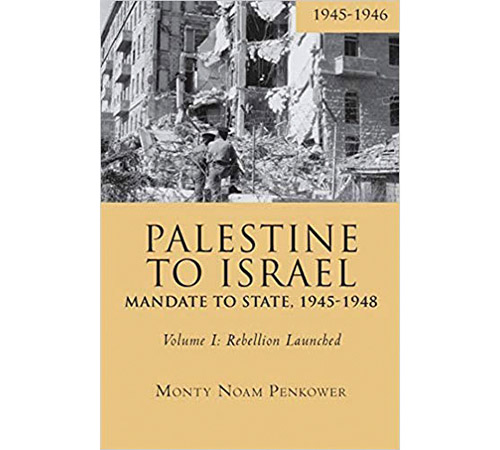
Reviewing: “Palestine to Israel: Mandate to State, 1945-1948,” by Professor Monty Penkower. Touro University Press. 2019. English. Paperback. 358 pages. ISBN-13: 978-1618118745.
This year, Monty Noam Penkower, professor emeritus of Jewish History at the Machon Lander Graduate School of Jewish Studies in Jerusalem, has continued his major contribution to the field of Middle East studies, providing an in-depth analysis of the conditions surrounding the establishment of the State of Israel.
With “Palestine to Israel, Mandate to State, 1945-1948” volumes I and II, he has completed the trilogy that began with “Palestine in Turmoil: The Struggle for Sovereignty, 1933-1939” and “Decision on Palestine Deferred: America, Britain, and Wartime Diplomacy, 1939-1945.”
In the last two books, Penkower places the period in historical context, describing the developments in the territory then known as Palestine and in the Arab states from 1945-1948. In the process, he exposes the ways in which Palestine became a pawn in inter-Arab feuds; how the American government responded, publicly and privately, to events in the region; and how British and U.S. policy was shaped by Holocaust survivors, languishing in Europe after World War II, as well as by the 600,000 Jews already in Palestine.
And all this against the background of the Cold War.
Penkower superbly recounts the behind-the-scenes drama at the U.N. involving the U.S. government and the State Department, the Russian government, the British Colonial and Foreign Offices, the Arab nations, the Arabs living in Palestine, the Union of South Africa’s Prime Minister Jam Smuts and the other member states of the U.N.—33 of which voted in favor of the creation of Israel, 13 of them from Latin America and the Caribbean.
In a protracted debate in the British House of Commons on January 26, 1949, Winston Churchill, then-leader of the opposition in Parliament, summarized the mood after the establishment of the Jewish state. “Whether the Right Honorable Gentleman likes it or not,” he said, “the coming into being of a Jewish state in Palestine is an event in world history to be viewed in the perspective not of a generation or a century, but in the perspective of a thousand, two thousand, or even three thousand years…This is an event in world history.”
Penkower observes that “in the end, two historic trends had converged to bring about the ultimate vote: achievement in Zion and the Holocaust in Europe.”
At the time, Arab refusal to accept any of the U.N. recommendations regarding portioning Palestine into a Jewish state and one for the Arabs hurt their cause in the international arena. In a letter to U.N. Secretary-General Trygve Lie on February 6, 1948, Jamal e-Husseini, representing the Palestinian-Arab Higher Committee, detailed his reasoning: “The Arabs of Palestine…will never submit or yield to any Power going to Palestine to enforce partition. The only way to establish partition is first to wipe them [the Jews] out—man, woman, and child,” which is precisely what the Arabs had planned for the Jews.
Given the plethora of studies on the creation of Israel, it is tempting to downplay the possibility that Penkower’s two latest volumes can add to the understanding of what has become an intractable conflict. That would be a mistake.
By Alex Grobman, PhD
Dr. Grobman is a Hebrew University-trained historian, senior resident scholar at the John C. Danforth Society, and a member of the Council of Scholars for Peace in the Middle East.













